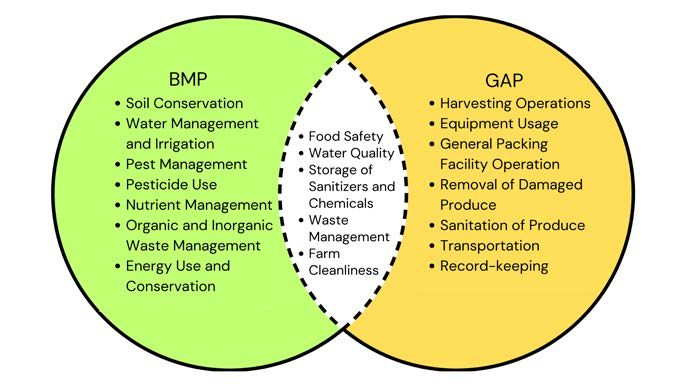Are you striving to make the most out of your small farm? Water management is key.
Without the right practices, all your hard work could go down the drain—literally. Imagine maximizing your crop yield, reducing costs, and nurturing the environment, all by mastering how you handle water. This isn’t just about saving a few drops; it’s about revolutionizing your entire farm operation.
Picture this: healthier crops, lower bills, and a thriving ecosystem. You have the power to transform your farm into a model of efficiency. The secret lies in understanding the best water management practices tailored for small farms like yours. These strategies can boost your productivity and sustainability, making your farm not only survive but thrive. Dive into this article to discover the techniques that will empower you to take control. Your farm’s future is in your hands, and with the right water management, you’ll reap the rewards. Let’s explore how you can turn the tide in your favor.

Efficient Irrigation Techniques
Small farms benefit from efficient irrigation techniques, which ensure optimal water use. Drip irrigation and rainwater harvesting help conserve resources. These practices enhance crop growth and reduce water waste, essential for sustainable farming.
Efficient irrigation techniques are essential for small farms aiming to conserve water and boost productivity. By using the right methods, you can maximize the benefits of every drop and ensure your crops thrive. Let’s dive into some efficient irrigation techniques that can transform how your farm uses water.Drip Irrigation Benefits
Drip irrigation is a game-changer for small farms. It delivers water directly to the roots, minimizing waste and evaporation. This method is perfect for water conservation and can significantly reduce your water bills. Think about the ease of setting up a drip system. You can customize it to fit your crops’ needs. It’s simple yet effective. Many farmers have found that drip irrigation not only saves water but also improves crop yield. Imagine walking through your farm, knowing each plant is getting exactly what it needs. Drip irrigation allows you to control the water flow with precision. This can be particularly beneficial during dry spells.Sprinkler System Optimization
Sprinkler systems can be highly effective if optimized correctly. Adjusting the nozzle type and coverage area can make a big difference in efficiency. It’s about getting the most out of each drop. Consider timing your sprinkler system to operate during cooler parts of the day. This reduces evaporation and ensures your crops receive adequate moisture. Have you ever thought about using sensors? They can automate watering based on soil moisture levels, preventing over-watering. Have you checked the water pressure in your system recently? Sometimes, small tweaks can lead to big savings. High pressure can lead to overspray, wasting precious resources. A well-optimized sprinkler system can be a reliable ally in your water management strategy. By embracing these techniques, you’re not just saving water—you’re investing in a sustainable future for your farm. How will you enhance your irrigation practices today?Rainwater Harvesting
Rainwater harvesting offers effective water management for small farms. Collect and store rainwater for irrigation and livestock. This sustainable practice reduces water bills and conserves resources, ensuring farm sustainability.
Rainwater harvesting is a practical and efficient method for small farms to enhance water management. By capturing and storing rainwater, you can reduce reliance on external water sources and cut down on utility costs. Plus, it’s a sustainable practice that helps conserve valuable natural resources, making your farm more environmentally friendly.Storage Solutions
Selecting the right storage solution is crucial for effective rainwater harvesting. Tanks and barrels are popular choices due to their affordability and ease of installation. Consider the size of your farm and average rainfall to determine the appropriate capacity for your storage units. Underground cisterns offer a discreet option if space is a concern. They help maintain water quality by keeping it cool and free from sunlight exposure. However, they might require professional installation, which could be an additional cost to factor in. Do you have an existing structure, like a barn or shed? Utilize those rooftops as catchment areas to channel rainwater into your storage system. This technique maximizes the efficiency of your setup without needing extra space.Utilization Strategies
Once you’ve captured the rainwater, the next step is efficient utilization. Direct the stored water to your irrigation system to keep crops hydrated without tapping into your primary water source. Drip irrigation systems are especially effective, as they deliver water directly to the plant roots, minimizing waste. Consider using rainwater for livestock needs. It can be filtered and treated to ensure safety, providing a sustainable water supply for your animals. This approach not only conserves water but also promotes a self-sufficient farming operation. What about cleaning farm equipment? Rainwater is ideal for non-potable uses such as washing tools, machinery, and even farm vehicles. This practice helps maintain equipment efficiently while conserving treated water for essential purposes. Embracing rainwater harvesting can transform water management on your small farm. It’s about making informed choices and implementing practical solutions to ensure your farm thrives sustainably. What steps will you take today to harness the power of rainwater?Soil Moisture Conservation
Effective soil moisture conservation is essential for small farms. It helps maintain healthy crops and optimize water use. Farmers can improve soil moisture by adopting specific practices. These practices ensure water reaches plant roots and reduces evaporation.
Soil moisture conservation also enhances soil health. It supports sustainable farming by reducing the need for additional irrigation. Farmers benefit by saving water and promoting plant growth.
Mulching Methods
Mulching is a simple yet effective technique. It involves covering the soil with organic or inorganic materials. Organic mulch includes straw, grass clippings, and leaves. These materials decompose and enrich the soil.
Inorganic mulch includes plastic or landscape fabric. It prevents weed growth and retains moisture. Mulch acts as a barrier, reducing water loss from evaporation. It keeps the soil temperature stable and protects plant roots.
Cover Cropping Advantages
Cover cropping is another valuable practice. It involves growing specific crops to cover the soil. These crops prevent soil erosion and improve soil structure. Common cover crops include clover, rye, and oats.
Cover crops enhance soil moisture by increasing organic matter. They also help fix nutrients, making them available for future crops. By planting cover crops, farmers improve soil fertility and retain moisture.
Using these methods, small farms can conserve soil moisture efficiently. This leads to healthier crops and better yields.

Water Quality Management
Water quality management is crucial for small farms. Clean water is essential for crops and livestock. Ensuring the purity of water sources can improve farm productivity. It also helps in maintaining the health of plants and animals.
Filtration Systems
Filtration systems help remove impurities from water. They ensure water used in farming is clean. Different filters suit different needs. Sand filters, for example, remove larger particles. Carbon filters help eliminate odors and chemicals. Investing in the right system enhances water quality on the farm.
Testing And Monitoring
Regular testing and monitoring of water quality is vital. It helps identify potential contaminants early. Simple test kits can detect pH levels and bacteria. Monitoring ensures corrective actions can be taken promptly. This practice safeguards crops and livestock health.

Conclusion
Small farms benefit greatly from effective water management. These practices save water and boost crop health. Simple techniques like rainwater harvesting and drip irrigation are essential. They help maintain soil moisture and reduce waste. Farmers can also monitor water usage with smart technology.
This reduces costs and conserves resources. By adopting these practices, small farms ensure sustainable growth. They protect their environment and secure a better future. Smart water management is crucial for long-term success. Start implementing these strategies today for healthier farms and communities.



